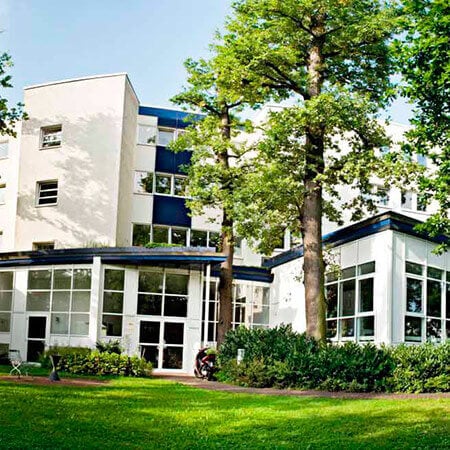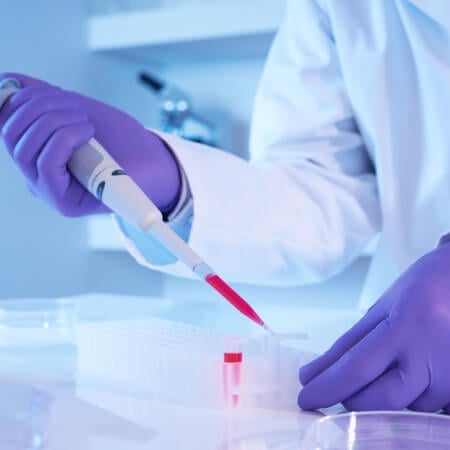Hospitals for Stem Cell Therapy in Germany
Each hospital in this list meets Booking Health’s strict international standards: at least 250 surgeries per year, ISO‑certified quality management, and documented survival outcomes. Our medical board then ranks the clinics by clinical expertise, technology, and patient‑satisfaction scores.

Germany, Frankfurt am Main
Clinic of Advanced Biological Medicine Frankfurt am MainOverall rating10 / 10
The Clinic of Advanced Biological Medicine Frankfurt am Main is a unique medical facility with rich and successful experience in the application of integrative medical methods for the treatment of cancer and chronic diseases. For over 40 years, a competent interdisciplinary team of doctors has been combining traditional medicine
Stem cell therapy for Alzheimers disease
Price from:
Go to the program
27223.6
22223.6 Stem cell therapy for amyotrophic lateral sclerosis (ALS)
Price from:
20790
Go to the program Stem cell therapy for autism
Price from:
Go to the program
27505.48
22505.48 Stem cell therapy for chronic pancreatitis
Price from:
Go to the program
27641.2
22641.2 Stem cell therapy for diabetes melitus
Price from:
Go to the program
27171.4
22171.4 Stem cell therapy for diabetic neuropathy
Price from:
Go to the program
27296.68
22296.68 Stem cell therapy for diabetic retinopathy
Price from:
Go to the program
27651.64
22651.64 Stem cell therapy for dilated and ischemic cardiomyopathy
Price from:
Go to the program
27512.79
22512.79 Stem cell therapy for erectile dysfunction (impotence)
Price from:
Go to the program
27536.8
22536.8 Stem cell therapy for immunodeficiency disorders
Price from:
Go to the program
27196.68
22196.68 Stem cell therapy for liver cirrhosis (fibrosis)
Price from:
Go to the program
27484.6
22484.6 Stem cell therapy for Lyme disease
Price from:
Go to the program
27119.2
22119.2 Stem cell therapy for multiple sclerosis
Price from:
Go to the program
27484.6
22484.6 Stem cell therapy for oncological diseases
Price from:
Go to the program
27171.4
22171.4 Stem cell therapy for optic nerve atrophy
Price from:
Go to the program
27102.72
22102.72 Stem cell therapy for Parkinsons disease
Price from:
Go to the program
27495.04
22495.04 Stem cell therapy for pulmonary fibrosis
Price from:
Go to the program
27098.32
22098.32 
The ANOVA IRM Clinic for Regenerative Medicine is an advanced medical facility specializing in regenerative, cellular, and translational medicine. The clinic is unique not only in Germany but also in the world and was the first center in Europe to perform stem cell therapy with the corresponding certification of the German and E
Stem cell therapy for Alzheimers disease
Price from:
20594
Go to the program Stem cell therapy for amyotrophic lateral sclerosis (ALS)
Price from:
20934
Go to the program Stem cell therapy for autism
Price from:
20929
Go to the program Stem cell therapy for chronic pancreatitis
Price from:
28900
Go to the program Stem cell therapy for diabetes melitus
Price from:
20722
Go to the program Stem cell therapy for diabetic neuropathy
Price from:
20569
Go to the program Stem cell therapy for diabetic retinopathy
Price from:
20844
Go to the program Stem cell therapy for erectile dysfunction (impotence)
Price from:
20866
Go to the program Stem cell therapy for immunodeficiency disorders
Price from:
20653
Go to the program Stem cell therapy for liver cirrhosis (fibrosis)
Price from:
21047
Go to the program Stem cell therapy for Lyme disease
Price from:
20920
Go to the program Stem cell therapy for multiple sclerosis
Price from:
20552
Go to the program Stem cell therapy for oncological diseases
Price from:
21096
Go to the program Stem cell therapy for optic nerve atrophy
Price from:
20790
Go to the program Stem cell therapy for Parkinsons disease
Price from:
20550
Go to the program Stem cell therapy for pulmonary fibrosis
Price from:
20785
Go to the program 

